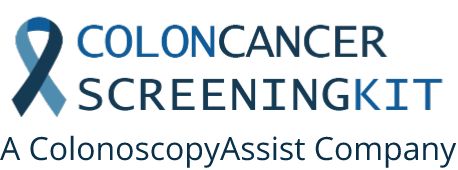Notice of Privacy Practices
THIS NOTICE DESCRIBES HOW INFORMATION ABOUT YOU MAY BE USED AND SHARED AND HOW YOU CAN GET ACCESS TO THIS INFORMATION. PLEASE REVIEW IT CAREFULLY.
I. Who We Are
This Notice describes the privacy practices of ColonoscopyAssist and ColonCancerScreeningKit.com.
We will share your health information among ourselves to facilitate your treatment, payment, and health care operations.
II. Our Privacy Obligations
The law requires us to maintain the privacy of certain health information called “Protected Health Information” (“PHI”). Protected Health Information is the information that you provide us or that we create or receive about your health care. The law also requires us to provide you with this Notice of our legal duties and privacy practices. When we use or disclose (share) your Protected Health Information, we are required to follow the terms of this Notice or other notice in effect at the time we use or share the PHI. Finally, the law provides you with certain rights described in this Notice.
III. Ways We Can Use and Share Your PHI Without Your Written Permission (Authorization)
In many situations, we can use and share your PHI for activities that are common in many hospitals and clinics. In certain other situations, which we will describe in Section IV below, we must have your written permission (authorization) to use and/or share your PHI. We do not need any type of permission from you for the following uses and disclosures:
A. Uses and Disclosures for Treatment, Payment and Health Care Operations. We may use and share your PHI to provide “Treatment,” obtain “Payment” for your Treatment, and perform our “Health Care Operations.” These three terms are defined as:
- Treatment. We use and share your PHI to provide care and other services to you—for example, to diagnose and treat your illness. In addition, we may contact you to provide appointment reminders or information about treatment options. We may tell you about other health-related benefits and services that might interest you. We may also share PHI with other doctors, nurses, and others involved in your care.
- Payment. We may use and share your PHI to receive payment for services that we provide to you. For example, we may share your PHI to request payment and receive payment from Medicare, Medicaid, your health insurer, HMO, or other company or program that arranges or pays the cost of some or all of your health care (“Your Payor”) and to confirm that Your Payor will pay for health care. As another example, we may share your PHI with the person who you told us is primarily responsible for paying for your Treatment, such as your spouse or parent.
- Health Care Operations. We may use and share your PHI for our health care operations, which include management, planning, and activities that improve the quality and lower the cost of the care that we deliver. For example, we may use PHI to review the quality and skill of our physicians, nurses, and other health care providers. As another example, we may share PHI with a Patient Relations Coordinator to resolve any complaints you may have and make sure that you have a comfortable experience with us.
In addition, we may share PHI with certain others who help us with our activities, including those we hire to perform services.
B. Your Other Health Care Providers. We may also share PHI with your doctor and other health care providers when they need it to provide Treatment to you, to obtain Payment for the care they give to you, to perform certain Health Care Operations, such as reviewing the quality and skill of health care professionals, or to review their actions in following the law.
C. Judicial and Administrative Proceedings. We may share your PHI in the course of a judicial or administrative proceeding in response to a legal order or other lawful process.
D. Law Enforcement Purposes. We may share your PHI with the police or other law enforcement officials as required or permitted by law or in compliance with a court order or a subpoena.
E. Decedents. We may share PHI with a coroner or medical examiner as authorized by law.
F. As required by law. We may use and share your PHI when required to do so by any other law not already referred to above.
IV. Uses and Disclosures Requiring Your Written Permission (Authorization)
A. Use or Disclosure with Your Permission (Authorization). For any purpose other than the ones described above in Section III, we may only use or share your PHI when you grant us your written permission (authorization).
B. Uses and Disclosures of Your Highly Confidential Information.Federal and state law requires special privacy protections for certain highly confidential information about you (“Highly Confidential Information”), including any portion of your PHI that is: (1) kept in
psychotherapy notes; (2) about mental health and developmental disabilities services; (3) about alcohol and drug abuse prevention, Treatment and referral; (4) about HIV/AIDS testing, diagnosis or Treatment; (5) about venereal disease(s); (6) about genetic testing; (7) about child abuse and neglect; (8) about domestic abuse of an adult with a disability; (9) about sexual assault; or (10) Invitro Fertilization (IVF). Before we share your Highly Confidential Information for a purpose other than those permitted by law, we must obtain your written permission.
V. Your Rights Regarding Your Protected Health Information
A. For Further Information; Complaints. If you want more information about your privacy rights, are concerned that we have violated your privacy rights, or disagree with a decision that we made about access to your PHI, you may contact our office. You may also file written complaints with the Office for Civil Rights (OCR) of the U.S. Department of Health and Human Services. When you ask, we will provide you with the correct address for the OCR. We will not and can not take any action against you if you file a complaint with us or with the OCR.
B. Right to Receive Confidential Communications. You may ask us to send papers that contain your PHI to a different location than the address that you gave us, or in a special way. You will need to ask us in writing. We will try to grant your request if we feel it is reasonable. For example, you may ask us to send a copy of your medical records to a different address than your home address.
C. Right to Revoke Your Written Permission (Authorization). You may change your mind about your authorization or any written permission regarding your Highly Confidential Information by giving or sending a written “revocation statement” to our office. The revocation will not apply to the extent that we have already taken action where we relied on your permission.
D. Right to Inspect and Copy Your Health Information. You may request access to your medical record file, billing records, and other records used to make decisions about your Treatment and payment for your Treatment. You can review these records and/or ask for copies. Under limited circumstances, we may deny you access to a portion of your records.
E. Right to Amend Your Records. You have the right to request that we amend PHI maintained in medical record files, billing records, and other records used to make decisions about your Treatment and payment for your Treatment.
VI. Effective Date and Duration of This Notice
A. Effective Date. This Notice is effective as of
July 1st, 2017.
B. Right to Change Terms of this Notice. We may change the terms of this Notice at any time. If we change this Notice, we may make the new notice terms effective for all Protected Health Information that we maintain, including any information created or received prior to issuing the new notice. If we change this Notice, we will post the new notice on this internet site page. You also may obtain any new notice by contacting us.






